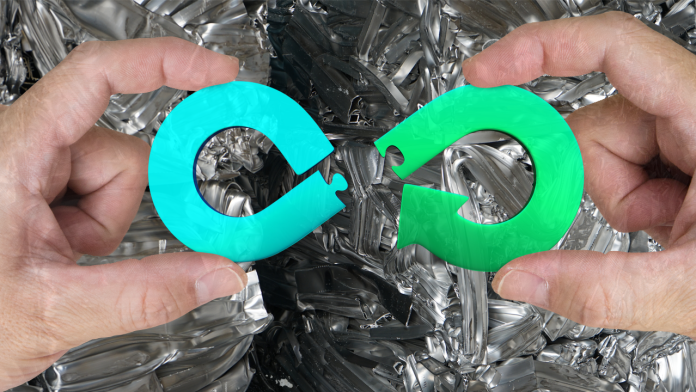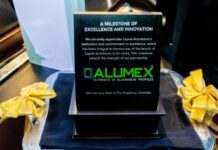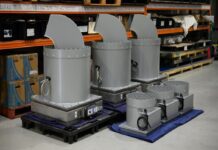
Media Release by Australian Aluminum Council
Australia’s largest aluminium smelter, Tomago Aluminium, has recently signed an agreement with Australia’s largest extruder and distributor of Aluminium products, Capral Aluminium. The agreement is for Capral to supply approximately 550 tonnes of production scrap to Tomago Aluminium annually for remelting. This industry leading arrangement is the first of its kind within Australia, paving the way toward access to low carbon aluminium for Australian manufacturers.
Luke Hawkins, General Manager Supply and Industrial Solutions at Capral Aluminium comments, “As far as we are aware this is the first commercial scrap arrangement for post-production scrap aluminium to be remelted in Australia and we are very excited to be working on this with the team at Tomago Aluminium.”
Aluminium remelt is the secondary recycling of aluminium, as opposed to primary raw extraction of aluminium from bauxite. In aluminium remelt furnaces, aluminium is remelted and recycled into new products.
Whilst scrap aluminium has long been collected for recycling within Australia, until recently Australian aluminium smelters have had limited capacity for safe and successful remelting. More than 95% of Australia’s scrap aluminium is exported for recycling. The major buyers are in South Korea and Indonesia. Other main markets include European countries and India. In 2020 Australian exporters reported 119,075 tonnes of aluminium were sent overseas, an increase of 25.13% on the previous year. [1]
“Australian customers are demanding access to more sustainable aluminium and we need to make changes as an industry to respond to this. For Capral that means working in close partnership with our suppliers to ensure we have access to Australian aluminium with recycled content,” said Luke.
Capral is Australia’s largest producer and distributor of aluminium products with six manufacturing facilities throughout Australia, extruding aluminium for use in a diverse range of industrial, manufacturing and construction applications.
Production scrap from Capral’s Penrith extrusion plant will be baled and sent to Tomago to be remelted and added to new aluminium products – including billet.
“The scrap we provide will be scrap that is generated during the extrusion process, the aluminium billet used by our Penrith plant is supplied by Tomago which means they are able to ensure the alloy of the scrap is known which is critical for the remelt process.
Generally, aluminium smelters have limited capacity for remelt. This is because of the safety and process risks of contamination. We’ve worked closely with Tomago to define this arrangement to ensure we provide scrap content which is of value to Tomago and able to be successfully and safely remelted,” Luke explains.
Within Australia, aluminium production largely relies on coal-fired electricity to power the process. For aluminium smelters like Tomago Aluminium the production chain never stops. Whilst Australian aluminium smelters are working hard to reduce the energy intensity of their process and utilise clean energy sources, Australian aluminium smelters currently use approximate 14% of the power produced by our national energy grid. [2]
Tomago Aluminium uses around 10% of the New South Wales power supply to produce 590,000 tonnes of aluminium per year.
Commenting on the new arrangements, Tomago Aluminium CEO Matt Howell said:
“We are delighted to be able to close the loop for Capral and Tomago in a true ‘cradle to grave’ aluminium alloy supply and recycle arrangement. Best off all, the product that is made in NSW is now recycled in NSW. With global supply chains experiencing significant disruption and carbon footprint an increasing consideration, these new arrangements do not require international shipping through already congested ports.”
Recycling of aluminium alloys at Tomago requires very little electricity and uses a tiny fraction of the energy required to produce primary aluminium. Often the raw aluminium from our potlines must be cooled from ~950 degrees to ~720 degrees to be processed through the cast products department and having clean, dry extrusion scrap is a perfect way to do this.”
Aluminium can be recycled again and again, almost infinitely, making it an incredibly sustainable material. Recycling aluminium requires up to 95% less energy than production from ore, avoiding emissions, including greenhouse gases. [3]
“This is a critical and important step for Capral and Tomago Aluminium; let’s call it the first significant step towards developing local circularity for Capral. We are excited to embark on this journey with such a progressive and committed supplier and look forward to developing opportunities to build a local market for low carbon aluminium in Australia,” Luke states.
In addition to the recycling of Aluminium, Tomago are also currently working with Capral to investigate the feasibility of re-using the timber dunnage that the product is strapped to for transport.




















